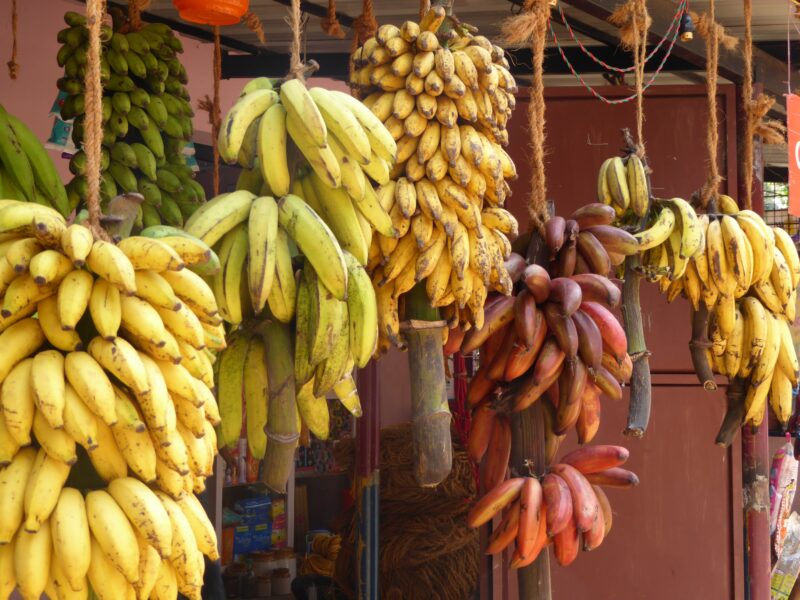
With the current fighting in Ukraine, and sanctions on Russia, some nations are facing the real possibility of food shortages next year. Ukraine is an agricultural powerhouse, which produces a high percentage of some global crops, in particular wheat. Of course, there have been global shortages throughout the pandemic. The rising price of gas -before the invasion of Ukraine- had already created series social and economic issues from Brazil to Europe. Still, no commodity may be as fundamental as food.
The Guardian has a wonderful article, “Our Food System isn’t ready for the climate crisis,” which looks at how global societies have become increasingly reliant on a declining number of crops. In turn, there has been a dramatic reduction in the genetic diversity of the crops that we do use. Plant varieties may be selected less for their ability to evade disease than their ability to be shipped large distance without rotting. As a result, our entire food web has become less resilient at the same time that we face the greatest challenge in modern history, the dramatic impact of climate change.
There are some scholars who suggest that one of the factors that led to the Bronze Age collapse around 1172 BC (and the end of an earlier period of globalization) was the loss of tin supply routes from Afghanistan, which made it difficult to produce bronze. As we’ve seen during the COVID-19 pandemic, if China enters lockdown, car manufacturers in Germany can’t get their chips. As the Financial Times reported in a recent podcast, the world has a critical shortage of some key metals.
One of my favorite books is Joseph Tainter’s, the Collapse of Complex Societies. The work combines both archaeology and a systems perspective to look at how civilizations collapse. Tainter’s argument is that societies tend to become increasingly complex in order to address problems, but that with time this complexity often carries increasing costs while delivering marginal returns. When the costs of complexity begin to exceed its advantages, societies can suddenly become simpler, less hierarchical, more rural and smaller. In other words, they collapse.
I think many people have been aware for a long time how vulnerable aspects of modern society are to all kinds of shocks. But the COVID-19 pandemic has led to a fascination with the supply underpinnings of our global economy. The podcast “Ship happens” has become an unexpected hit, which is unusual for a podcast that focuses on logistical issues and the global supply chain. But I think that if there was just one global area to focus on it should be food, even more than energy. You can work remotely, dress more warmly, or take a bus to reduce your energy consumption. But it’s hard for most urban dwellers to produce much of their own food.
When I moved into my new apartment in Portland this year there was a bottle of wine waiting for me on the counter. It was a 2020 pinot noir from an Oregon winery. While I appreciated the gift, it was almost undrinkable because forest fires in California and Oregon that year had given the grapes a powerfully smoky taste. Whites or a pinot blanc were unaffected, because they lose their skins during the wine making process. But red wines that year tasted like smoke. Besides the impact of fires, the climate in Oregon is changing, which will impact wineries throughout the state. Last fall I spent six weeks in Portugal, which has a long history growing wine in a warmer and dryer climate, using grape varietals that have emerged over the course of more than two millennia. Why don’t wine producers in Oregon adopt these varieties? There are a plethora of options, which would be well-suited to future climate scenarios in the state. But they take time to grow, so that if we are going to experiment with this option, these varieties need to planted now. Ten years ago would have been better, and twenty years ago even better yet.
To the best of my knowledge, only one vintner in Oregon is experimenting with Portuguese, Spanish, Italian or Greek varietals. I think that Abacela may be the leader in the industry (many thanks to Stephen Frenkel for this information). Brazil has made real advances in wine production in the last thirty years, but you would never know it outside the country itself. Wine snobs would probably not even try wine produced in the tropics. Instead, with wine, bananas, avocados and potatoes, we usually still rely on the same old options that we did a generation or two ago. But climate change is coming. If the pandemic and Ukrainian invasion rock our current supply chains, what will happen when global warming seriously impacts food production? We need to rethink which crops we rely on, which varietals we use, and how we supply food on a global level.
References
Lakhani, Nina, Alvin Chang, Rita Liu, and Andrew Witherspoon. “Our Food System Isn’t Ready for the Climate Crisis.” The Guardian. April 14, 2022. https://www.theguardian.com/food/ng-interactive/2022/apr/14/climate-crisis-food-systems-not-ready-biodiversity.
Tainter. (1988). The collapse of complex societies. Cambridge University Press.
